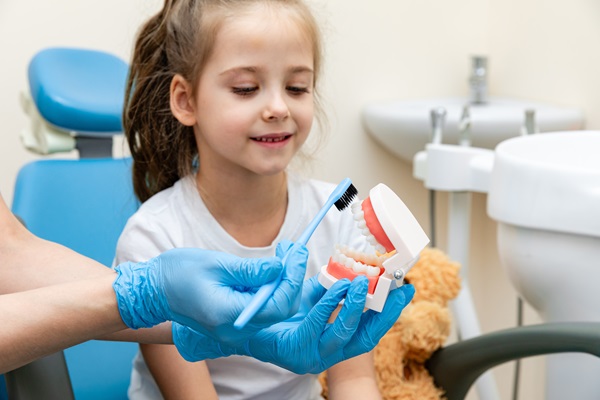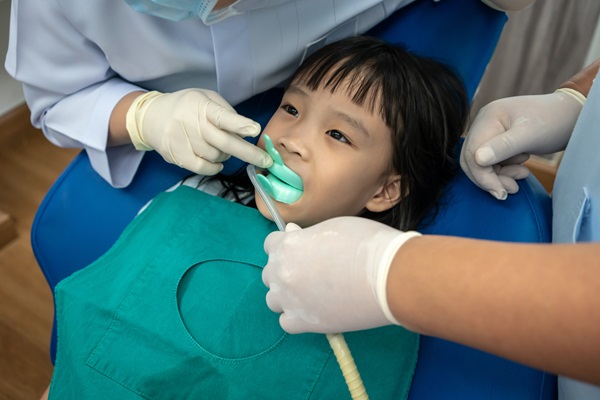 Visiting a pediatric dentistry office with your child ensures his or her future relationship with oral hygiene and dentists, in general. Whenever your child suffers from oral injuries, consider making an appointment with your pediatric dentist to uncover any underlying problems. For instance, injuries to the tongue and teeth could indicate a deeper jaw or tooth structure problem.
Visiting a pediatric dentistry office with your child ensures his or her future relationship with oral hygiene and dentists, in general. Whenever your child suffers from oral injuries, consider making an appointment with your pediatric dentist to uncover any underlying problems. For instance, injuries to the tongue and teeth could indicate a deeper jaw or tooth structure problem.
Why is your child biting his or her tongue or lip?
There are various reasons a child may bite his or her lip. Everyone bites their tongue sometimes, but if it becomes a consistent problem, there is usually an underlying condition to blame. If your child often bites their lip, it could indicate an issue with the jaw or teeth.
Malocclusion
Malocclusion refers to the teeth not aligning properly in the mouth. When your child's teeth do not line up correctly, it becomes difficult to chew. He or she may have to chew harder or find it difficult to pronounce words correctly. There are different types of malocclusion, with there being three standard categories.
Class III malocclusion
If your child's lower teeth stick out more than the upper teeth, resulting in an underbite, your child may have Class III malocclusion. Class III can also include a crossbite with overlapping lower and upper teeth.
Within Class III, there are types of malocclusion. In Type I, kids have good alignment but an abnormal arch. Type II has good upper front teeth alignment, but the lower teeth tilt toward the tongue. In Type III, the upper teeth lean in the direction of the tongue, and the lower teeth are aligned as they should be.
Class II malocclusion
In pediatric dentistry, a Class II malocclusion is where the upper teeth stick out past the lower teeth, causing an overbite. In Type I, your child's teeth angle toward the lips, often leading to lip biting when eating. In Type II, on the other hand, the central incisors lean toward the tongue, causing damage to the tongue.
Class I malocclusion
Class I involves an overlap. This is where the upper teeth stick over the lower teeth. In Class I, the bite is normal, aside from the overlap. Often, teeth overlap because of extended bottle use or thumb-sucking in childhood. For the three types of Class I malocclusion, children can have teeth that angle toward the tongue in type I. Type II involves narrow arches with upper teeth sticking out but lower teeth angling toward the tongue. In Type III, the front teeth angle in the direction of the tongue.
Jaw misalignment
There are various reasons that a child's jaw may have improper alignment. This can result from developmental issues, teeth that are too big for the mouth, early loss of baby teeth, or different size upper and lower jaws. Through an examination, professionals can indicate jaw alignment issues that may lead to tongue and lip biting.
Conclusion
It is normal for a child or adult to bite his or her tongue or lips accidentally. However, it could point to an underlying condition when it becomes a habit or if your child risks damaging his or her tongue and lips because of biting. Children who consistently bite their tongue or lip may require pediatric dentistry treatment.
Request an appointment or call Nett Pediatric Dentistry & Orthodontics at 623-759-7658 for an appointment in our Phoenix office.
Recent Posts
Cavity treatment for kids is a chief concern among parents, and for a good reason. Cavities are common in children of all ages. According to the Centers for Disease Control and Prevention, over half of the kids ages 6 to 8 have had at least one cavity in a primary tooth. The good news is…
Pediatric dentistry focuses on the oral problems that occur in children. Many dental issues in kids are similar to those that occur in adults. Without proper treatment, dental problems can progress to misaligned teeth and poor oral health. If you want to maintain your child’s dental health, here are the common dental issues that pediatric…
In their early years, your youngster is still a novice in brushing and flossing their teeth, meaning that cleaning your child's teeth in that period is your responsibility. Cleaning the teeth is a skill that the child should learn. Your role is to educate your youngster on how to keep their mouths clean and healthy.…


